Why does one website rank on the first page of Google while another gets buried on page five? It’s not luck, it’s SEO. If you’re new to SEO, understanding ‘on-page‘ and ‘off-page‘ strategies can feel tricky—but they’re essential for digital success.
This guide is here to break down the differences between on-page and off-page SEO for beginners, so you’re able to see how the two work together to get your website noticed. On-page SEO covers everything you can control on your site—like content, keyword usage, and site structure, while Off-page SEO focuses on external factors—such as backlinks, social signals, and domain authority.
When combined, these two strategies boost rankings, drive traffic, and strengthen your online presence. So let’s break it down to basics, and provide your website with the best chance for SEO success one page (and link) at a time! It’s time to take control of your online presence and rise through the rankings. Your SEO quest begins here!
What Is On-Page SEO, Really?
On-page SEO (or on-site SEO) refers to the practice of changing a web page to improve its ranking in search results and attract the right visitors. This includes improving the on-page words or content, writing quality titles and descriptions, using links between pages within your site, as well as images and other related aspects of a web page in a way that search engines and users can understand easily.
Following are the techniques of On-page SEO :
- Provide Valuable Content: Include information that is easy to comprehend and actually provides value for the readers. Try to use the words/phrases that they will be using in their Google queries.
- Develop Enticing, Compelling Titles and Descriptions: When your page appears in the search engine results page (SERP), people see the title and a short summary, make great efforts to ensure that those titles and descriptions are clear, compelling and truly represent what the page is about.
- Keep Your Page Links Clean and Easy to Use: Your URLs should be readable and give people an idea about what the page is – no weird numbers or symbols – if someone sees a link they should have a reasonable idea of what it is.
- Provide Helpful Links to Other Pages on Your Website: If someone is reading one page, give them places to check out more. Linking to other pages on your site will help keep people engaged and help them find more of what they are looking for.
- Use Images Correctly: Photos make your page more interesting, but they should load quickly and have some type of description or caption so that people and search engines are able to determine what they are about.
- Ensure Your Site is Usable on Mobile Phones and Tablets: Lots of people use the internet from their phones, so we want to make sure that your website looks good and functions correctly on smaller screens as well.
- Keep Your Site Quick: Slow pages are the worst! Nobody wants to wait for a page to load. A faster website will keep visitors happier and less likely to navigate away.
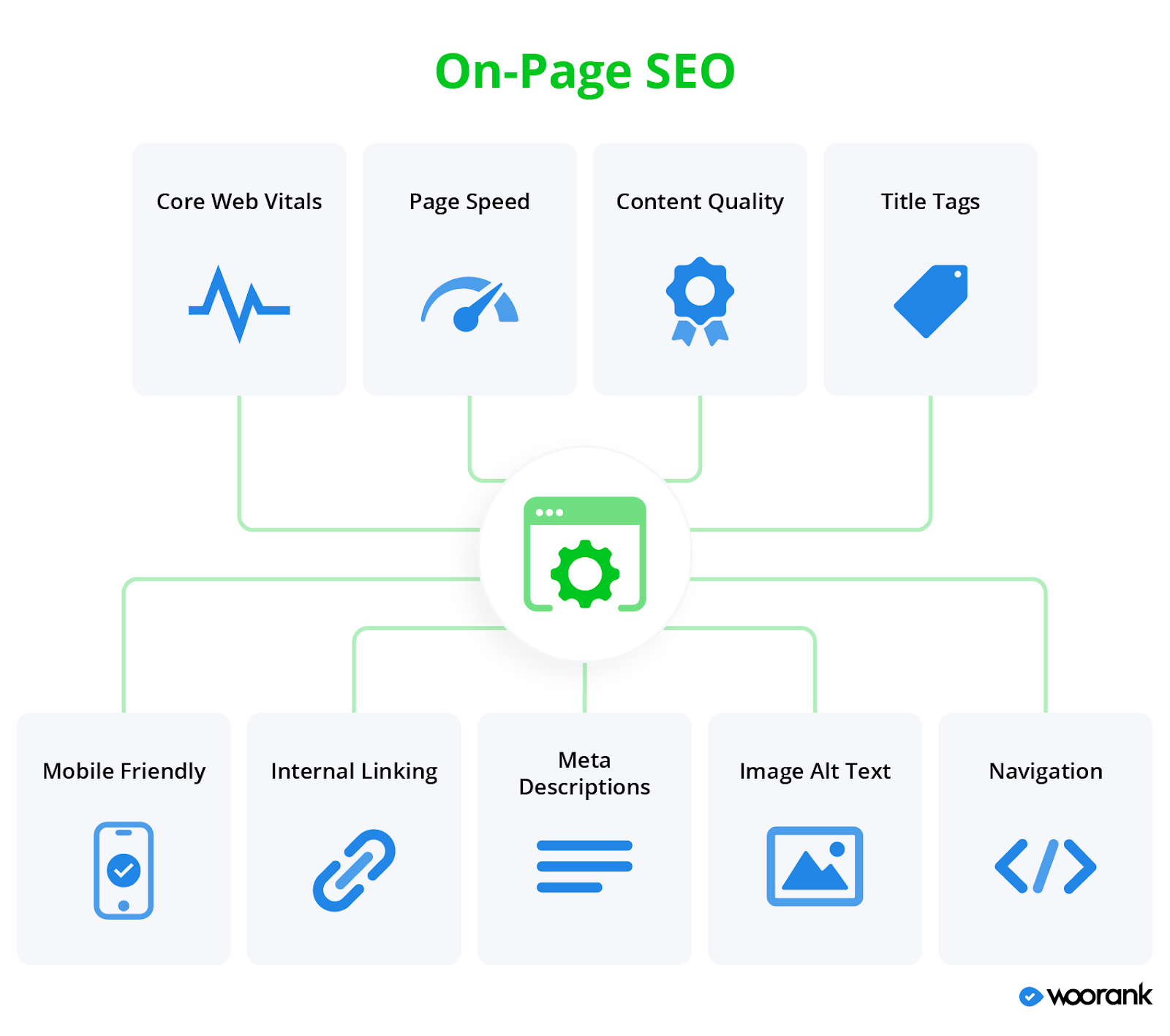
Image Source: WooRank
The Importance of On-Page SEO
On-page SEO is super important because it allows your website to function and display as effectively as possible for both visitors and search engines. If you walked into a retail store and everything was neat, easy-to-find, and inviting, would you want to stay there? Of course! This is the same case when a user is experiencing your website.
When a user clicks on your page, and it loads quickly, it is easy to read with legible content, is simple to navigate, and is not cluttered with ads and distractions, the user tends to stay longer on your website, and they can browse to find what they need quite easily without getting lost amid the distractions.
Another consideration for encouraging on-page SEO are the search engines you are looking for recommendations from and advertising your webpage to. Google, for example, does not want to recommend websites where users do not have a good experience!
With the correct layout and target keywords applied naturally, Google will understand your website better than most users will, and recommend the content to more people. Ultimately, the purpose of on-page SEO is to enhance the friendliness and help of your web pages, which ultimately gets you more visits and brings users back!
What Is Off‑Page SEO, Exactly?
Off-page SEO is significant because it shows search engines that your website is credible and desirable. Search engines see links from other websites back to your site as votes of credibility. This is why the top-ranking page has 3.8× more backlinks. As other trustworthy sites link back to yours search engines see your content is credible and worth sharing. The result is that you rank better in search engines and more people find you.
Elements of off-page SEO can be social media shares and online mentions which mean that others are spreading the word about your site.
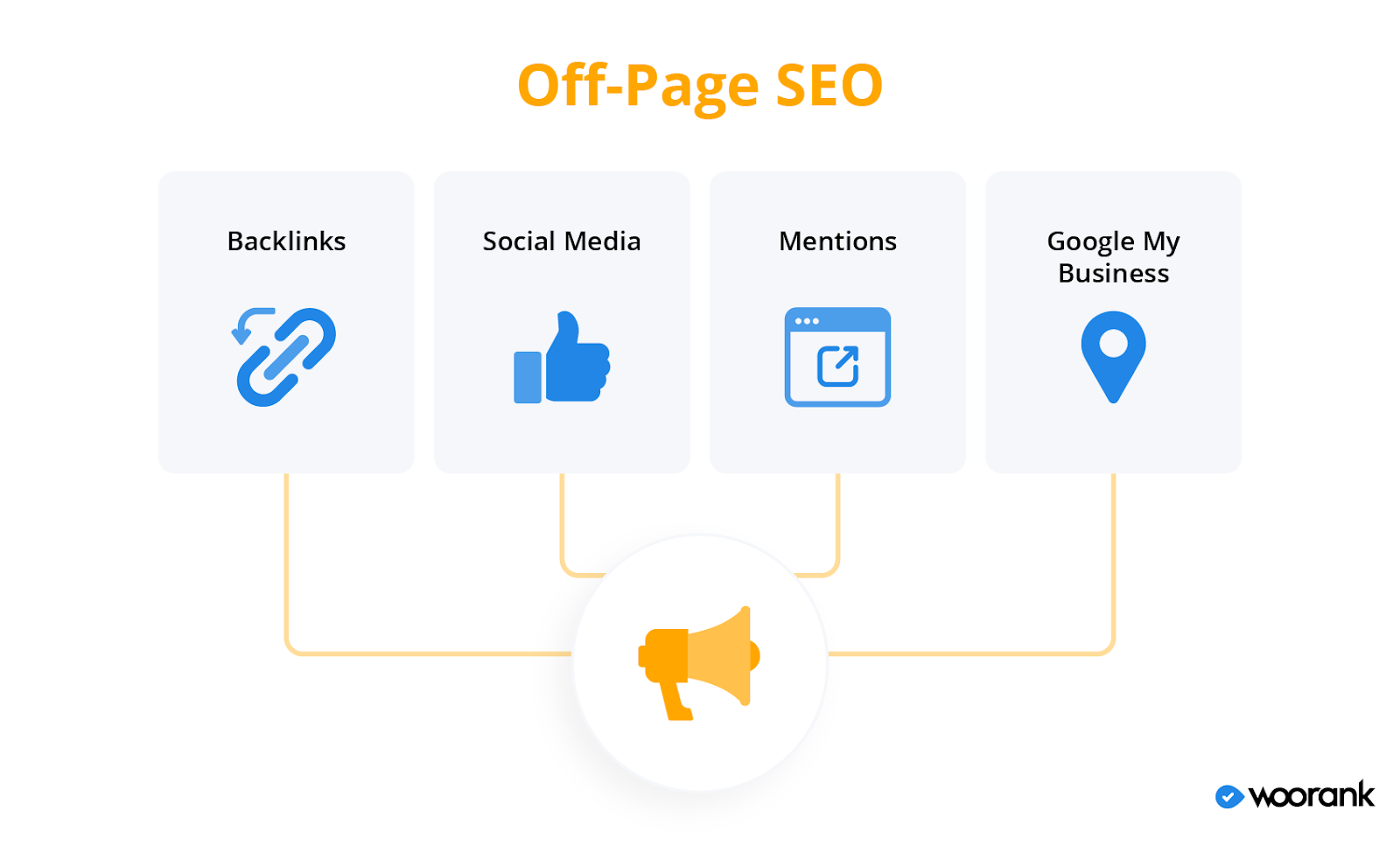
Image Source: WooRank
You may have an excellent site, but off-page SEO gets your site in front of the larger internet. Following are the techniques of off page SEO :
- Backlinks: When other sites link to yours, they are showing that they trust you and see value in your content to the search engines and to people!
- Social Media Sharing: Having your site posted to Facebook, Instagram, or Twitter helps get your message, and a link to your site, to way more people.
- Guest Blogging: You can offer guest articles on other sites, and, if they like your article they can include a link back to your site. This gives you another site to link to and a way to deliver your knowledge to more readers and bring increased visitors to your site.
- Influencer Outreach: If you can include the ask on the site or someone who can speak of your site to their followers, then the potential reach could be huge! Once again this can draw in new audiences from direct or indirect mentions of your site across social media.
- Online Reviews: Positive reviews on Google, Facebook, and Yelp help create trust with your business, but it also signals to search engines that you are legit and it strengthens you in the local listing area.
- Forum Participation: Join online communities and discussion boards related to your topic. Either help others when people ask questions, or when it’s appropriate and relevant, share a link to your website.
- Brand Mentions: Being mentioned online is effective even if somebody links to your site. Simply a mention helps angle your business name awareness throughout the audience and supports trust with the engaged parties.
Difference Between On-Page SEO and Off-Page SEO
Think of on-page SEO as ensuring your house is neat and tidy so the intended visitors are comfortable when they arrive. Off-page SEO is neighbors talking to others about how great your house is, and now the neighbors encourage their friends to visit you. On-page SEO is what you control, which is your content, your structure on the page, etc. Off-page SEO, is creating buzz for your site popularity and trust of your site with backlinks, shares on social, etc.
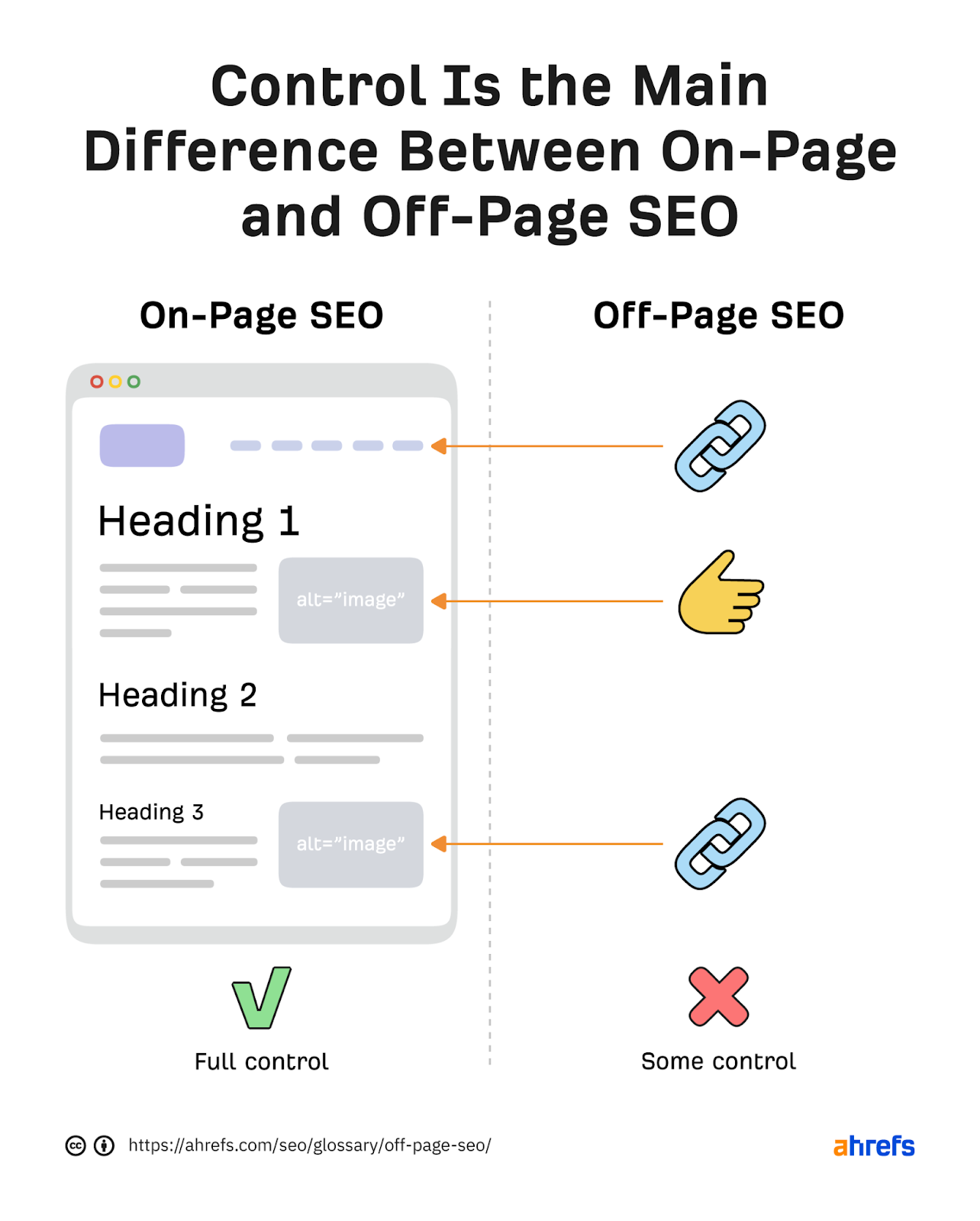
Image Source: Ahrefs
How On-Page and Off-Page SEO Combine for Success?
You could be thinking, “Is on-page SEO going to work if I have no off-page SEO?” In this scenario, imagine you had a really nice restaurant where the food is spectacular (on-page SEO), but no one knows where it is (off-page SEO nonexistent). Then, every person knows about your really nice restaurant, but the food is horrible so no one sticks around.
The best case is when you have a nice looking website, things work well and you have linkage references back from other sites or people. In this case, they are the perfect compliment, and on-page SEO gets your site prepped for work and off-page SEO opens the door for visitors to walk through for business.
What’s More Important, On-Page or Off-Page SEO?
That’s an excellent question! Thinking of it this way: if your website has really bad design or hardly any content, no amount of telling or sharing will matter because people won’t stick around. On-page SEO establishes the right foundation to build from. The catch is: if no one knows about your website or if no one trusts your website, it does not matter how amazing your content is, because no one is going to see it in the first place.
And this is where off-page SEO starts kicking in, much like you know friends tell friends about your business. So, I think, in the end, both are equally as important as the other and they both work together. A good website, and good reputation.
How Knowing On-Page and Off-Page SEO Can Change Your Website’s Results?
Consider a bakery. On-page SEO is like ensuring your cakes taste great and that your store is clean inside and out. Off-page SEO is your customers having a good experience, friends hearing about and trusting their experience, and writing positive reviews. You could have the highest quality tasting cakes, but without the word of mouth (little to no off-page SEO) you won’t get customers. If a few people enjoyed the cakes and told others it wouldn’t take long before your bakery was busy. The concept for your website is no different, you need both.
If you’re thinking about why your website’s not showing up on Google, more often than not, it’s because of your SEO strategy or lack thereof. SEO doesn’t involve just understanding on-page and off-page SEO, it involves just as much technical detail; understanding on-page and off-page SEO is the key to understanding how to obtain better traffic, visibility and rankings.
First, let’s discuss on-page SEO. On-page covers anything that you have control over on your own site: content, keywords, site speed, and site structure. On-page is more powerful than you think. As Backlinko noted, the top 3 search results on Google receive over 54.4% of all clicks. Therefore, optimizing your page for visibility is crucial. Only 1.74% of new pages make it to the top 10 in the first year, usually because they were not strong right from on-page fundamentals.
However, on-page optimization doesn’t provide visibility by itself. Off-page SEO is often how Google assigns your site authority. Off-page SEO includes backlinks, brand mentions, etc. An astonishing statistic from Ahrefs indicates that 96.55% of web pages receive no traffic from Google, mostly because they don’t have enough high-quality backlinks. Therefore, your content might be great, it may still be invisible without off-page SEO.
Even the experts agree: A survey featured by Referral Rock…
Referral Rock published a survey which highlighted that tactics like quality content, industry authority, and backlinks driven by referrals are important marketing engines. These off-page SEO strategies benefit both visibility and building trust and credibility for your business, which are both crucial factors when customers are engaging with your business.
A number of respondents to the survey reported that as much as 40% of their leads had come from trusted external sources, including: referrals, backlinks, and word-of-mouth referrals. This shows that while on-page SEO (keyword optimizing and structure improvements) is also important, off-page is equally as important. When another person legitimizes your business via a link on their blog, a mention on social media, or a referral from a customer, it signals to users and search engines alike that your content holds trust and value. When managing your general obligations with on-page SEO to include off-page authority support is the answer to long-term success with SEO.
Just Starting With SEO? These Easy Tips Will Help
If you are new to SEO, this really is easy to get started doing. These are specialized ways to assist :
- Use keywords naturally – do not flood the content with them and do not spam.
- Organize your content into subsections using headings that are easy to read.
- Use catchy but clear page titles and meta descriptions.
- Use descriptive URLs, but keep them short.
- Optimize images by compressing them and using alt-text.
- Ensure your page loads quickly and is mobile-friendly.
Here is checklist you can follow –
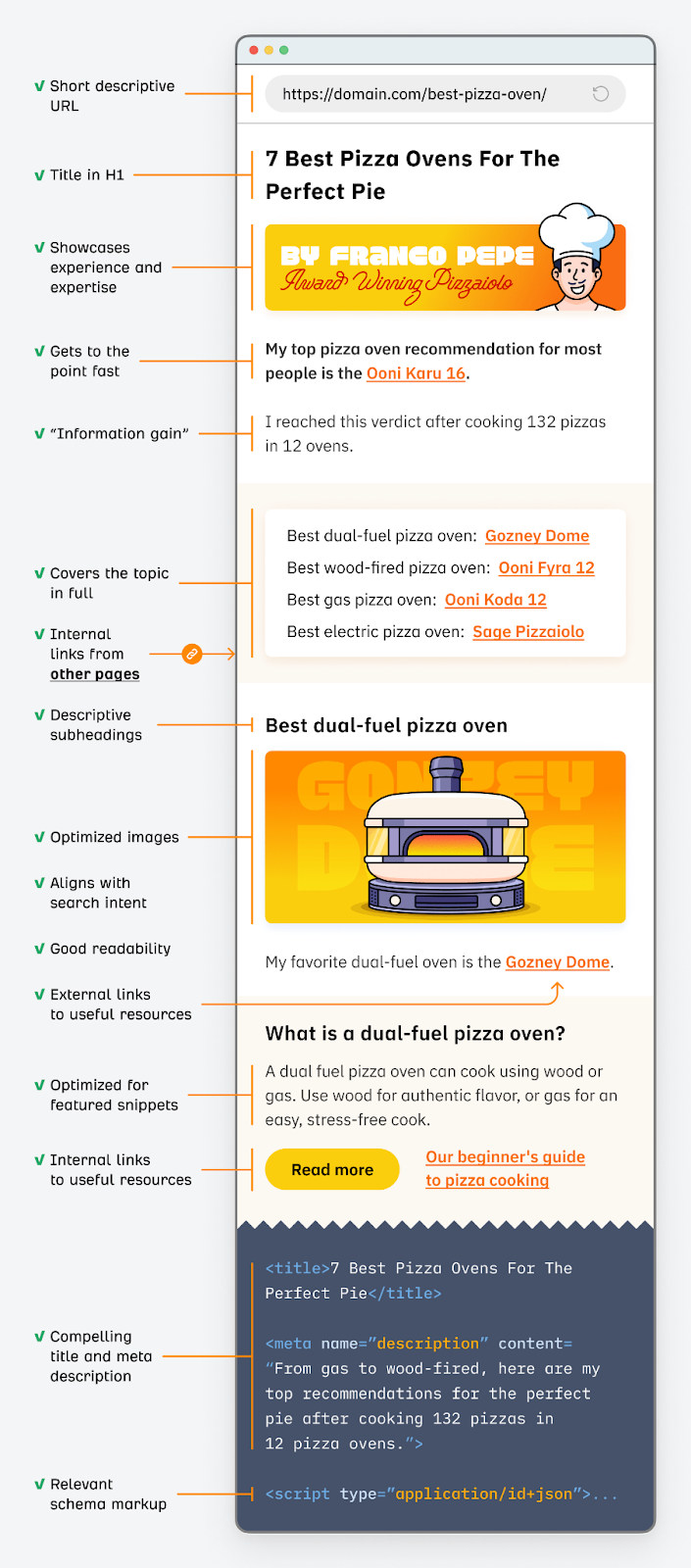
Image Source: Ahrefs
Swift Ways to Increase Off Page SEO
If you are looking for a “quick win” for your off-page SEO, get your site shared across social media channels. Your friends and followers can share that news quickly. You can also try to get guest posts on other blogs and backlink to your site and promote your site. You can even ask your customers to leave positive reviews on the web. These few simple tasks will help boost the trust and credibility of your site quickly and will increase your ranking in the search engine results.
- Share Your Creations on Your Social Media Channels – Post your creations on sites like Instagram, Facebook, or Twitter, so others can see it.
- Ask Others for Links to Your Site – If you have a blog or web page, ask bloggers or website owners if they would want to link to your page.
- Use Other Sites – Guest blogging is an excellent option for getting your work out, while gaining backlinks to your own site.
- Ask for Reviews – If you have a happy customer, ask them to leave you a positive review on Google or any other review site – it really does help.
- Join Online Communities Related to Your Work – Be helpful in forums or Facebook groups, and mention your website if it comes up in the conversation.
- Team Up With Influencers – If an influencer with a decent following enjoys your stuff, see if they would be willing to mention you.
SEO Slip-Ups to Stay Away From
- It’s Excessive Use of the Same Keyword – Stop using the same keyword repeatedly. It is awkward, and Google does not like it.
- Not Having Your Site Mobile Friendly – If your site is not appealing to mobile users, they will leave your site quickly.
- Website Loads Slow – If the site takes forever to load, most users will not wait.
- No Page Titles or Descriptions – Page titles and descriptions provide users an understanding of what the page is about in the search.
- Not Using Headings in Your Content– Headings help readers digest your page, and they also help Google understand your page better.
- Bad Links – If a link leads nowhere, that is a poor user experience.
- No Alt Text for the Images – Alt text tells search engines what your image is about, and it also tells people who cannot see images.
- Your Writing Only Provides Information for Google, and Not for People – Your content must help, and not just have information that is only filled with keywords.
- Not Linking Between Your Pages – Linking to your other pages allows you users to find more content, and stay on your site longer.
- Not Checking the Data for Your Site – If you don’t check data for what’s working how can you improve your site?
Ways to Measure Your Website’s SEO Progress
If you’re not convinced your website’s SEO campaigns are working… keep it simple! Are you getting more visitors to the website today than you were getting? Are they engaging with the site and clicking around? If the answer is YES! then you are on your way! Are they ranking higher on google search than before? If you find little improvements like that… then that is a very good sign that you are on the right track!
For professional help to improve those results even more, then look to WebRanker.io for custom SEO services that can help improve your website’s traffic, engagement and ranking.
- Increase in Visitation to Your Site: An increase in visitation to your site is indicative of meaningful content that is relatively easy to find.
- Increase in Time on Site and Number of Pages Viewed: When visitors are spending time reading your posts, it is an indication of valuable content.
- Your Site is Ranking Higher on Google Search: To check on your site and see if it is ranking on page one or near the top of page one, when visitors search What’s on your page will be a fair indicator of a well-ranking site.
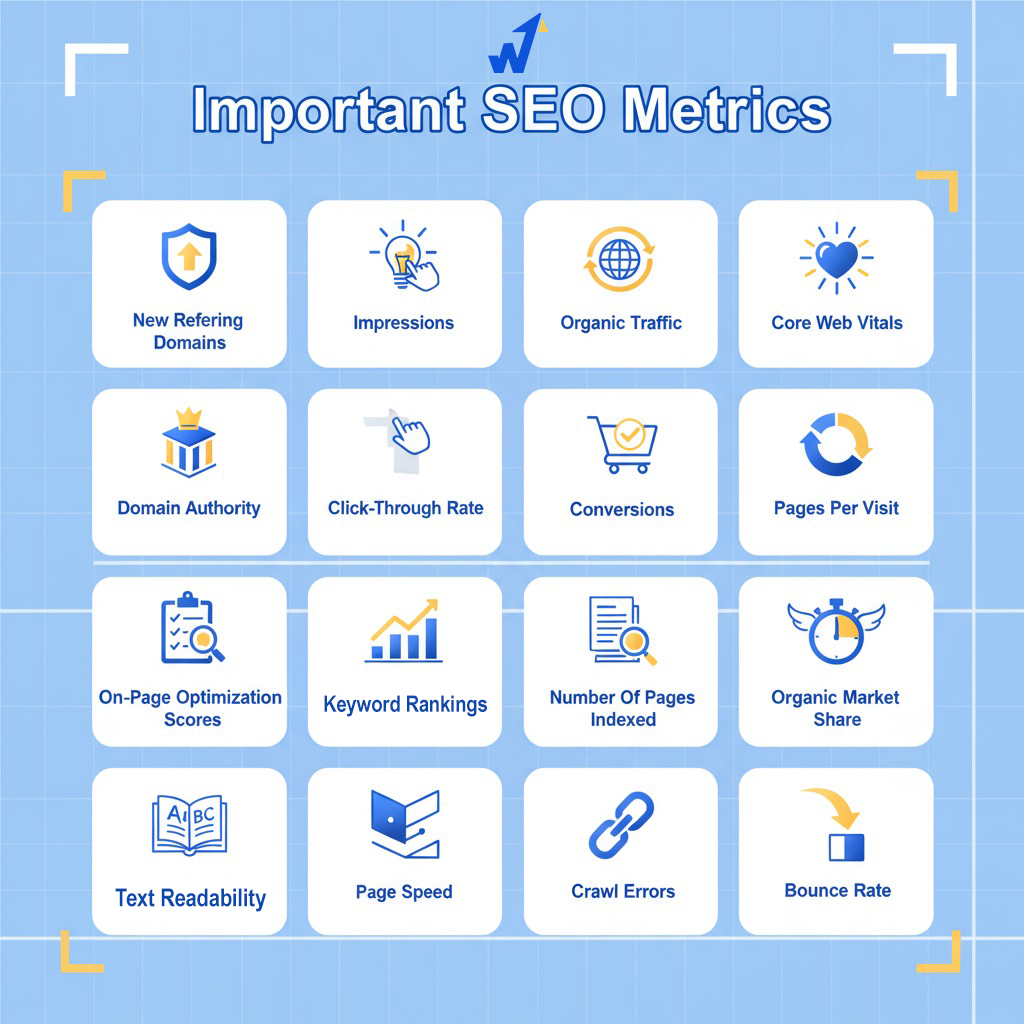
For example, if your easy cooking tips have moved from page 5 on Google to page 1, it may be an indication the on-page SEO content is working.
How Can You Measure the Success of Your Off-Page SEO Campaign?
- More Links from Other Sites: When you are gaining more links from other sites it shows the site trusts you.
- More Sharing on Social Posts: When people are sharing your posts on social sites (Facebook, Instagram and Twitter) it shows that more people are talking about you.
- More Good Reviews: Online good reviews can give a popularity and credibility to your business website.
For example, if you see more food bloggers linking back to your cooking tips page and sharing your posts on Instagram, then your off-page SEO is likely improving!
What WebRanker.io Delivers?
WebRanker.io is going to give a full service SEO agency experience which means:
- Full scale SEO audits, on page optimization, penalty recovery and enterprise SEO.
- Niche focused link building with outreach to high authority domains.
- International SEO for multilingual/global reach.
- Straightforward reports and a commitment to transparent and aligned strategy with measurable success.
- They emphasize organic traffic’s long term growth, custom solutions for SEO, and to create credible backlinks, with great case studies from clients that demonstrate large gains in ROI.
Conclusion
Getting started with SEO can definitely be a bit intimidating. The good news is that on-page and off-page SEO are both extremely beneficial! On-page SEO is mostly about the usability of your website and the quality of your content. Off-page SEO, on the other hand, is primarily about getting other sites to notice you and link to your content.
Be sure to utilize both methods properly, and you will grow in popularity and create credibility with Google. Always keep in mind that SEO isn’t a race, it takes time and persistence! Make sure you continue to learn, and apply those little improvements as things change!
SEO may sound complex, but it basically comes down to the right steps and some tenacity. Get your on-page and off-page SEO under control, and you can make your website an absolute traffic magnet! So let’s go for it, keep learning, and really watch our sites get higher and higher. Your online success is just around the corner!



